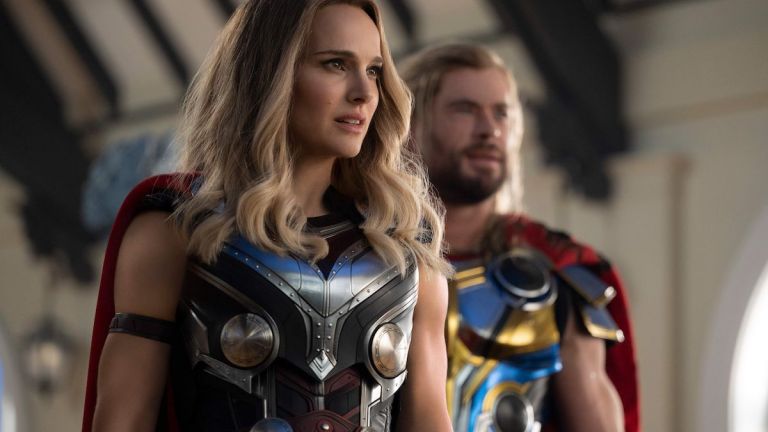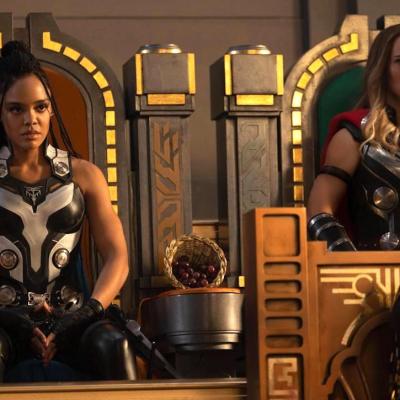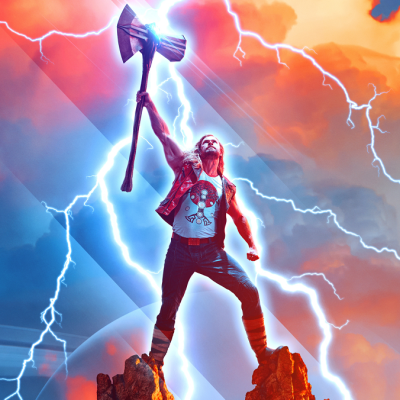In Thor: Love and Thunder Marvel Finally Does Right By Jane Foster
Thor: Love and Thunder finally gives Jane Foster the story she's deserved for the past decade.

The following contains Thor: Love and Thunder spoilers.
Thor: Love and Thunder is a movie that serves many masters. Part philosophical treatise on gods and belief, part bittersweet reflection on regret and making up for lost time, and part himbo road trip adventure complete with giant screaming goats, it’s a movie whose separate pieces don’t always mesh that well with one another but that somehow still ends up being more entertaining than it has any right to be.
And a big part of the reason for that is the long-awaited return of Natalie Portman as Dr. Jane Foster, a character who was introduced in the first Thor movie back in 2011 but was given little of substance to do beyond serve as Thor’s girlfriend. Here, she is finally allowed to come into her own, and in a movie that’s juggling a half dozen subplots of varying size and quality, Jane’s arc stands out as the film’s clearest and most emotionally resonant throughline.
In both the original Thor and its sequel Thor: The Dark World, Portman was little more than Oscar-winning set decoration. Jane had little story of her own and essentially only existed as a sort of overqualified damsel in distress. Her presence was necessary to further Thor’s emotional journey, from helping him remember how to be worthy enough to wield Mjolnir in the first place to putting a human face to the threat of the Dark Elves and their parasitic aether, but she never had much in the way of an arc of her own. Here, Jane finally gets the chance to drive her own narrative and make her own choices, and though her story intersects with Thor’s it thankfully never becomes about him. Instead, Love and Thunder gives Jane Foster something she’s never had before in this franchise: Real agency.
Portman is effervescent as a Jane finally free to be her adorkable self, who is allowed to fully nerd out about everything from explaining how black holes work to trying to figure out the superhero catchphrase for herself. A Stage IV cancer diagnosis of vague specificity leads her to seek out Mjolnir in an attempt to find a Viking space magic cure where chemotherapy has failed her, and though the film attempts to explain that the reason the hammer responds to her is that Thor once told it to protect her, the rest of the movie proves twice over that Jane is more than worthy on her own terms. Essentially reborn as The Mighty Thor, a six-foot-tall goddess with amazing hair and perfect make-up whenever she picks up the hammer, Jane gets the chance to find her inner hero in the depths of her own personal tragedy, and give her last days real meaning in the meantime.
As The Mighty Thor, Jane finds a more direct way to help save the world than science, even while using a hammer that, as it turns out, is literally draining her life away each time she wields it. However, her physical transformation is not just an excuse for wearing a cool costume (which, for the record, Portman totally rocks) but is also the method by which Jane can reclaim the strength and agency she feels that her cancer is rapidly stealing from her. Yes, once in hero mode she offers plenty of the standard jokes and quips that are such a familiar hallmark of the larger Marvel Cinematic Universe brand, but here, they are recast as convenient and awkward diversions that allow Jane to think about something other than her ongoing physical deterioration. As the Mighty Thor, Jane Foster can convince herself that she still has important things to do, and that dealing with potentially cosmic problems is more immediately necessary than facing up to the fact that she’s dying.
Though the Love and Thunder marketing machine leaned into the supposed romantic comedy aspects of the film, the movie is truly Jane’s story from start to finish, which is probably why it still struggles when it comes to depicting her and Thor’s romance. Though we see the two clash via an extended (and thankfully Korg-narrated!) flashback sequence that explores how difficult it is to date a superhero, much of their relationship still seems primarily based on the idea that the pair should be together simply because they’re a legacy comics romance, rather than any actual evidence that their bond is functional or healthy.
Thor, for his part, has decided he would rather “feel shitty” from loving someone rather than feel nothing but loneliness without doing so but otherwise, he seems relatively unchanged as a partner, and Jane is clearly struggling with the knowledge of her own impending death and not knowing how to ask for help when she needs it. Though the script hints that her transformation into The Mighty Thor has somehow put the pair on a more equal relationship footing—and to be fair, I think that’s actually true!—the two only seem to reunite romantically because Jane is dying (and the script says they should). Marvel’s ongoing larger issues with depicting love stories onscreen mean this shouldn’t come as much of a surprise, but it’s still disappointing, especially in a film that course corrects so much of what the franchise has done wrong when it comes to Jane’s character.
Because in the version of this movie that likely would have existed back in Phase One of the MCU, Jane would have probably stayed in her hospital bed and the film would have been content with her—in life or in death—serving as the emotional motivation that spurred Thor to fight harder (for a moment it almost feels as though that’s what will happen here). Instead, this Jane is given the chance not just to fight for herself, but to choose that fight with full knowledge of what that choice means and acceptance of the consequences that come with it. (I know I can’t be the only person who got chills when Mjolnir levitated itself beside Jane’s sickbed as a Slash guitar solo wailed in the background.)
Knowing that wielding the hammer again will cost her her life and yet choosing to do it anyway—that’s courage. That’s what heroes do. And while it sucks that we had to wait so long to see Jane get the chance to make this choice on her own terms, the moment is incredibly satisfying when it finally arrives. And the deft way Love and Thunder handles Jane’s arc—allowing her not just to fight for Thor and the children of Asgard but for the future she herself knows she will never see—is particularly impressive when contrasted with the franchise’s preceding effort, Doctor Strange in the Multiverse of Madness, a film which also featured a powerful woman dying in the name of saving the world.
Yet, unlike Wanda Maximoff, who isn’t even granted the right to own her own rage and whose unnecessary demise undoes an entire series’ worth of character work under a boulder-sized pile of hubris, Jane’s death feels like a new beginning. She strikes a classic hero pose as she calls the lightning strike that will shatter Mjolnir and seal her fate, a choice that deems her forever worthy, earns her a place in Valhalla amongst the Viking gods, and hopefully a shot at a franchise of her own one day. She has passed the test and become a true hero, and at long last when it comes to this character, it feels like Marvel has too.


